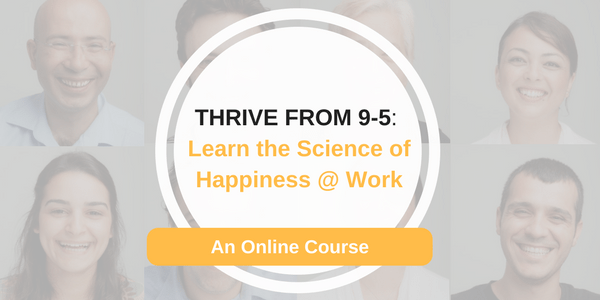
4 Science-Based Ways to Thrive From 9-5 at Work; Launching Our New Online Course!
If you choose to master your ability to Subdue Stress, Practice Positivity, Flow to Goals, and Revitalize Relationships, science suggests you will thrive at work. Below are ways to immediately apply the science.
Permit me to “start with why“. I’ve dedicated my career to teaching the science of happiness because I’ve seen too many people suffer while they work. My mission is to spread the science. Peer-reviewed research tells us it is possible to choose more happiness at work, and that if we do, our brains work better in most situations.
So, today I’m thrilled to announce the launch of our online course: Thrive from 9-5; The Science of Happiness at Work. It features 7 online videos, each with a worksheet, transcript, audio file, quiz, and more. You have the option to take a pre- and post-course test, so you can measure how much your happiness knowledge has increased. Access to a private online community rounds out the learning resources and let’s you connect with our team.
The content of the course is organized around four themes. Here are explanations and practical suggestions for the first theme, Subdue Stress:
Subdue Stress
Subduing stress doesn’t mean eliminating stress. To the contrary, it starts with re-framing stress. It’s not helpful to compound our stress by stressing about our stress. The Yerkes-Dodson law tells us that moderate stress is actually ideal for our health, performance, and happiness. Kelly McGonigal’s great TED talk shares research that suggests those that think of stress as a helpful, energizing force feel better and suffer less ill-health effects from stress.
While these re-framing techniques work well, they don’t handle 100% of the stress you will experience. Science says how we cope is critical; based on research we recommend three top coping techniques:
- Move your body. When Kelly McGonigal says that the stress response is energy preparing you for action, she means physical action. Sweaty palms help you grab a rock or stick better. So when you move your body after stress, you are giving that energy somewhere to go. Exercise not only reduces stress but also boosts cognition and mood. A “walking 1:1” meeting is one of my favorite ways to get activity at work.
- Talk with a friend. Science is clear: social support is real, effective support. Talking through something stressful with a supportive friend can help us cope better.
- Practice mindfulness. Mindfulness is essentially paying complete attention to the present moment without judgement. That might sound easy if you’ve never tried it. Those of us that have tried it know it’s an intense mental workout for your prefrontal cortex, which I call your “inner CEO“. Evidence suggests those who meditate enjoy reduced stress along with improved physical and mental health, better self-awareness and self-control, higher quality relationships, and more happiness.
Have you tried any of these strategies? How do they work for you? Your brain is unique so only you know what works best for you. I’d love to hear in comments below.
In future posts, I’ll be adding detail about these sections of our online course:
Practice Positivity
You’ve heard about positive attitude before, but probably not new ways to practice positive attitude that are largely proven effective by science. Stay tuned for research-based positive attitude tips that really work.
Flow to Goals
The focused zone where everything is clicking is called ‘Flow’. Learn how to reach this happy, productive state as you make progress toward clear and meaningful goals. And learn why science suggests multi-tasking is usually a bad idea.
Revitalize Relationships
Positive psychologist Chris Peterson summarized all of the science with these words: “other people matter”. Stay tuned and/or take the online course to learn ways to invest in relationships and happiness–and therefore success–at the same time.
Which brings me back to more ‘why‘. I’ve been fortunate enough to teach this science in person to clients including DreamWorks Animation, Microsoft, HP, Intel, Boeing, Bose, Activision, Blizzard Entertainment, Nike, and many more. As awesome as these experiences have been, my best possible future for 2017 says “Happy Brain Science makes a significant positive difference in the lives of over 1,000,000 people each year!” I need a way to help more people, and be able to be home with my family sometimes too.Thanks so much for making my Happy Brain Science career possible for the past five years, and thanks in advance for any support spreading the science of happiness through our online course and/or these posts.